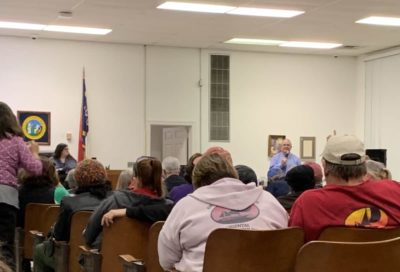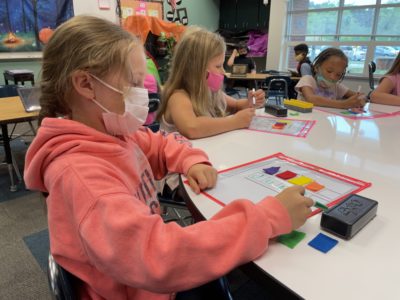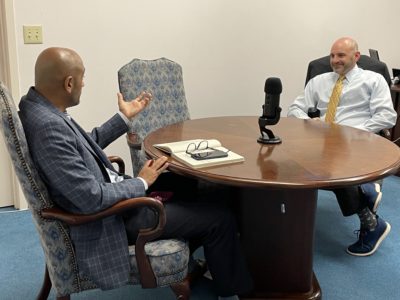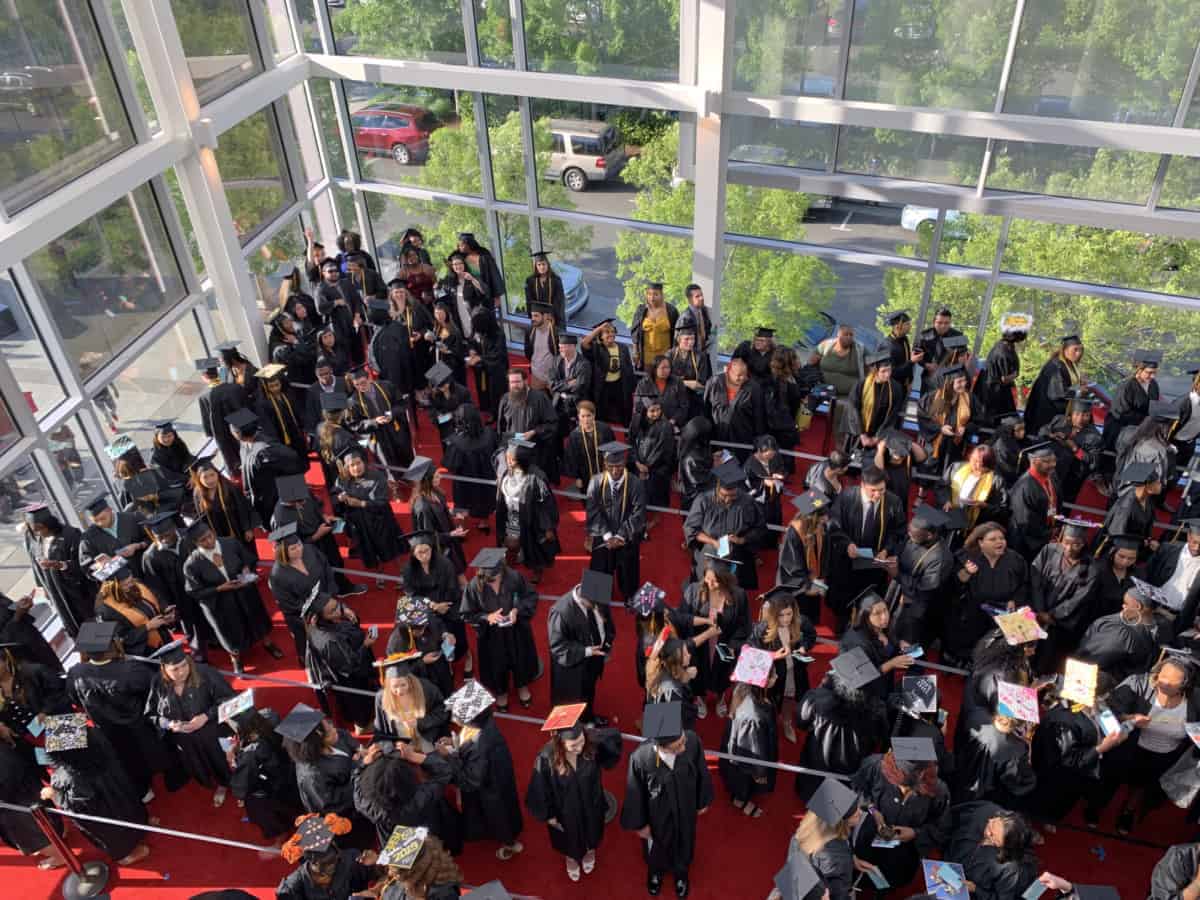
The sun is shining through the glass windows at the Durham Performing Arts Center, brightening most of the lobby prior to Durham Technical Community College’s graduation ceremony. Whatever space the sun isn’t reaching, Irina Conc’s smile is lighting up.
How in the world did she end up here, she’s wondering while pressing the pleats on her graduation gown — still a little surprised at herself. She is thinking back to the small town in Austria where she grew up watching “The Walking Dead,” wondering what life must feel like in America and dreaming of just visiting. She’s seen that dream come true. Now she’s about to walk across the stage to receive her Associate in Arts degree with a 4.0 GPA and a scholarship that will allow her to remain in the U.S. for two more years. And maybe longer, if her next dream comes true.
“When I started two years ago, I never thought I would actually be able to be a real student here,” Conc said. “And now today, I’m here and graduating. And I got a scholarship. So I just can’t believe today. I’m just really happy I found Durham Tech because it’s not possible without their help.”
The new dream, to become a journalist, feels much like the old dream did, a little too big: “I don’t know if I can do it. I have to take it one piece at a time.” But, as she stands in the lobby preparing for her final undertaking as a Durham Tech student, she is about to get one more dose of support from the Durham Tech family. It will come in the form of Robyn Tomlin — who, like Conc, used Durham Tech to spring board a transfer for her bachelor’s degree and, afterward, built a flourishing career in journalism.
At a broader level, Tomlin and Conc are examples of the head start a community college can provide students on a transfer path to four-year universities. But for Conc, Tomlin’s example is even more meaningful. It makes success at her next stop, Hollins University in Virginia, as well as her journalism goals feel a little more real.
“It’s like a dream,” Conc says of Tomlin’s example. “This is something I can’t even imagine right now.”
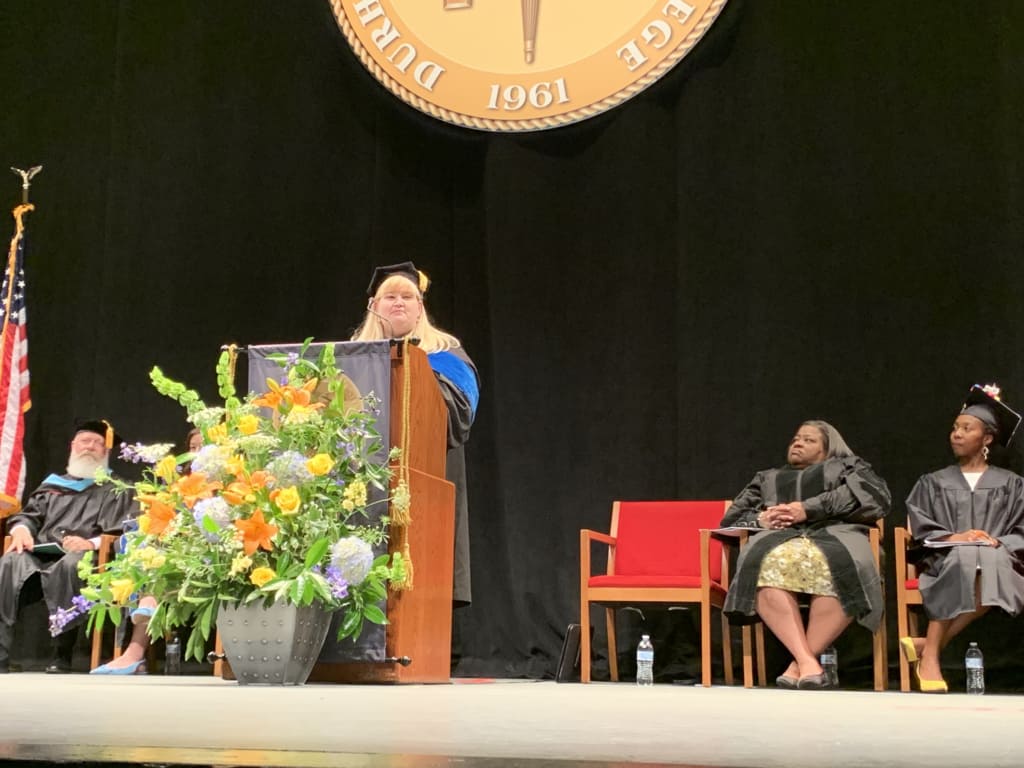
Tomlin describes herself as a late-bloomer when it comes to academics. She went to Chapel Hill High School before it was split into two schools. There, academic excellence was closer to the norm than the exception. Her peers were motivated and studious with promising undergraduate futures at four-year universities ahead of them.
“I had been a lackluster student,” Tomlin said. “I struggled to find the motivation I needed to be successful. I didn’t have a sense of my own talents, much less what I wanted to do with them. I was easily and often overwhelmed.”
That was even before her senior year, when Tomlin added to the mix another overwhelming and important priority.
“I discovered early in my senior year that I was pregnant,” she said.
One month after high school graduation, Tomlin had her son and her immediate concern was caring and providing for him. She stayed home, made money by providing day care for other parents, and immersed herself in a world of babies and toddlers. She was caring for five kids under the age of 2.
“At one point, I calculated that I had changed nearly 8,000 diapers over the course of that year,” she said. Her lifeline to the outside world? She would wait for the kids to take a nap and, afraid to make noise by turning on the television, she would read the newspaper: the Raleigh News & Observer.
“While I loved the kids,” she said, “it didn’t take me long to start dreaming of a brighter, diaper-less future for myself and my son.”
She knew that path would require college, but she wondered if she could handle it — let alone pay for it.
“I had a loving family that offered lots of emotional support,” she said, “but I was on my own when it came to financing my college career.”
That’s when she visited Durham Tech and started taking night classes. She eventually enrolled full-time and put herself through school with the goal of becoming a journalist. She even started a short-lived campus paper while taking courses in English and communications en route to an Associate in Arts degree. Buoyed by small steps into higher education and success at Durham Tech, Tomlin made her way to UNC-Chapel Hill.
“While I felt proud of how far I’ve come, I was worried about what was next,” she said. “Was I smart enough to succeed at Carolina? Would I be able to juggle parenting and work with an increasingly challenging academic workload? What if it turned out I wasn’t cut out to be a journalist, after all? It would have been easy to get carried away by the self doubt, but I decided to ignore it and focus on my goals.”
And, she specifically credited Durham Tech with giving her the confidence to allay those concerns.
Tomlin went on to major in journalism and set out on her career as a reporter. She has held various editorial positions, including metro editor at the Asheville Citizen-Times, editor of the Wilmington Star-News and managing editor at the Dallas Morning News. Last year, she was named regional editor overseeing eight McClatchy newspapers, including as executive editor for the one that sparked her interest in journalism — back when reading the N&O was her respite from dirty diapers.
“Robyn has led a truly remarkable career,” said Durham Tech President Bill Ingram. “She is a tremendous example of how a community college education can help pave the way to a successful career.”
An example that wasn’t lost on Conc.
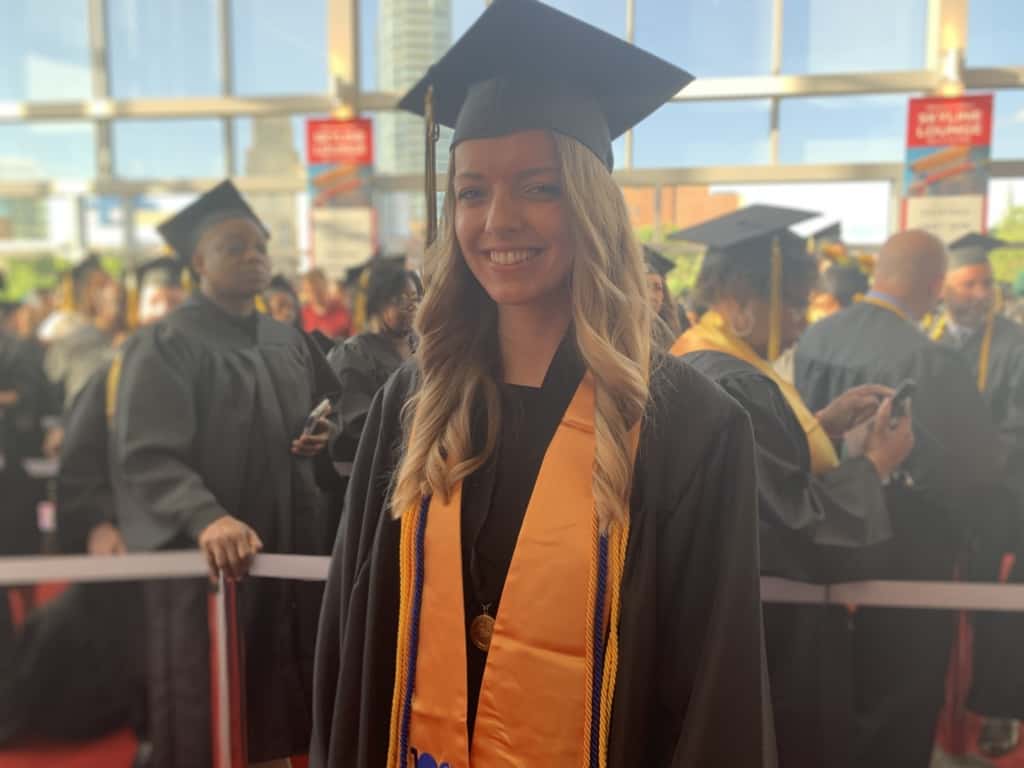
Conc wasn’t sure what the future had in store when she first left Ybbsitz, her small town of 3,000 people in the countryside of lower Austria. She just knew that ever since she was 12 years old, she was fascinated by America. She listened to American music and watched American television shows — even learning some English so that she could understand jokes from “How I Met Your Mother,” because they didn’t translate well in German.
She applied for a job as an au pair in the United States through a cultural child care program called Au Pair in America, and was approved and assigned to the Stringer family in Chapel Hill. One of the program’s requirements is that au pairs take continuing education courses, so with the help of her host parents, Jeff and Elizabeth, she enrolled at Durham Tech. Her goal at the time was modest.
“I just wanted to come here to experience life here and to improve my English,” she said. But as her English improved and she experienced life in Chapel Hill and at Durham Tech, “I just fell in love.”
Conc became intent on spending more time in America. Her town had offered schooling through middle school, and she had traveled an hour northeast to attend a tourism- and marketing-focused high school where she achieved high marks. But she had never been to college, and she wanted to experience higher education in America.
“When I had my first [continuing education] class here, I just thought that was super cool,” she said. “I was like, this is the American college experience. I was already thinking about, I wish I could go to college here, but it seemed unrealistic. In the very beginning, when I started to get information, I didn’t tell anybody because I thought everybody would be like, ‘Gosh, it’s crazy.'”
She soon found out it wasn’t, though. Advisers at Durham Tech spoke to her about what an associate degree track would look like. The school, and her host family, helped her apply for and obtain a student visa. And the college sat down and helped her figure out how to make college affordable.
“I was a little bit surprised that it was really affordable for me, otherwise I could not afford [college] at all,” Conc said. “But since I already saved some money at home when I worked, and [with] my au pair money, it was great for me that I could actually afford it.”
Raised in Austria, far from the popular culture of the United States, Conc had no prejudice against community colleges. That’s not necessarily the case for many raised in this country.
“Intellectually, a lot of people understand our value proposition, and we’ve made a lot of traction, but we need to get out from a bunch of outdated assumptions about community colleges,” community college advocate Steve Robinson told Inside Higher Ed. Robinson is a community college president in Toledo who pioneered #endccstigma. “It hit me that this is a stigma issue. I’m a direct person, so I’m trying to amplify what people have said about how inaccurate the stigma is.”
Community colleges have worked hard to combat these old ideas — particularly in North Carolina where they are demonstrating their value in providing efficient and affordable education that can help fill workforce needs. But Conc’s perspective is a revelation in what community college looks like with fresh eyes, untainted by any prejudice or stigma.
“There was so much happening,” she said. “So many things to do and so many amazing people. And then through my classes, I could kind of figure out what I’m interested in. I always knew math was not really my field, but it was great, the experiences that I got and how I could figure out that journalism and communications was the right thing for me.”
Conc made the most of her opportunity at Durham Tech. She was president of the Phi Theta Kappa International Honor Society, became an active volunteer with the Durham Tech Center for College and Community Service (CCCS), was a 2018-19 Dean’s Award recipient, and held a 4.0 GPA since she enrolled. She also got involved with a volunteer blog hosted by the school, despite her initial resistance.
While volunteering at CCCS, she told coordinator Jes Dormady that she wanted to become even more involved on campus.
“What about writing for our blog?” Dormady asked.
“But what about my English?” Conc replied, still a little uncertain of how her second language was developing. Dormady asked her to show up at one event and give it a try. Reluctantly, Conc wrote up a post and submitted it.
“And she loved it,” Conc remembers. “I was like, ‘Okay.’ And so that’s how I got the job. And that’s how I discovered I want to do journalism.”
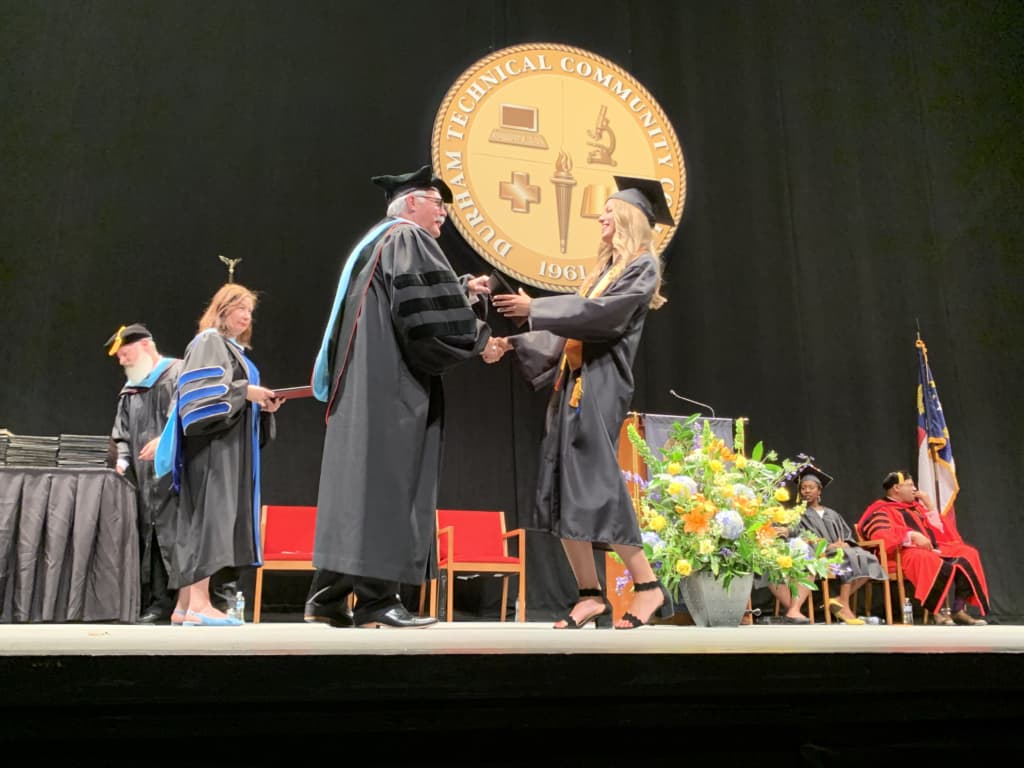
Conc wanted to continue her education in America after Durham Tech and pursue a career in journalism, but the money was running out. And four-year university tuition looks a lot different, she said, than community college tuition. But her Durham Tech family offered help once more, this time through her English instructor Lyndsay Al-Shibli.
Al-Shibli told Conc about an international scholarship to Hollins University, a private college in Roanoke, Virginia. Conc’s first reaction was the same as when she first thought about taking classes at Durham Tech and when she first was approached about writing for the blog: I’m not good enough.
But Al-Shibli pressed harder.
“I knew that without a substantial scholarship, Irina would likely have to return home to Austria and would have a hard time continuing her education,” Al-Shibli told Marcy Wynn of Durham Tech. “She had worked so hard for so long and sacrificed so much to live her American dream that I did not want this to be the end for her.”
The pair spent hours working on the application, and two months ago Conc learned that she was admitted to Hollins, and that she got a two-year scholarship worth $50,000 per year.
“I’m still sometimes shaking thinking about it,” Conc said. “I couldn’t believe it. All of it seems like a dream, I’m here [in America] and I’m graduating today and I have this scholarship. And it’s really because of them,” she says, pointing to a contingent of Durham Tech faculty.
After Hollins, Conc wants to earn her master’s degree from Columbia University and hopes to get a job in New York as a journalist. When asked what that would look like, she slips for an instant back to the doubt. But then she considers the auditorium she’s about to enter, the walk she’s about to make to get her diploma, and the woman who will be center stage to stand as a reminder that Conc’s dreams are not impossible.
“I have much more confidence now,” she said. “Because of all of the things that [Durham Tech] did for me. And I know that journalism is possible. Just look at her,” she said of Tomlin, her fellow Durham Tech graduate.
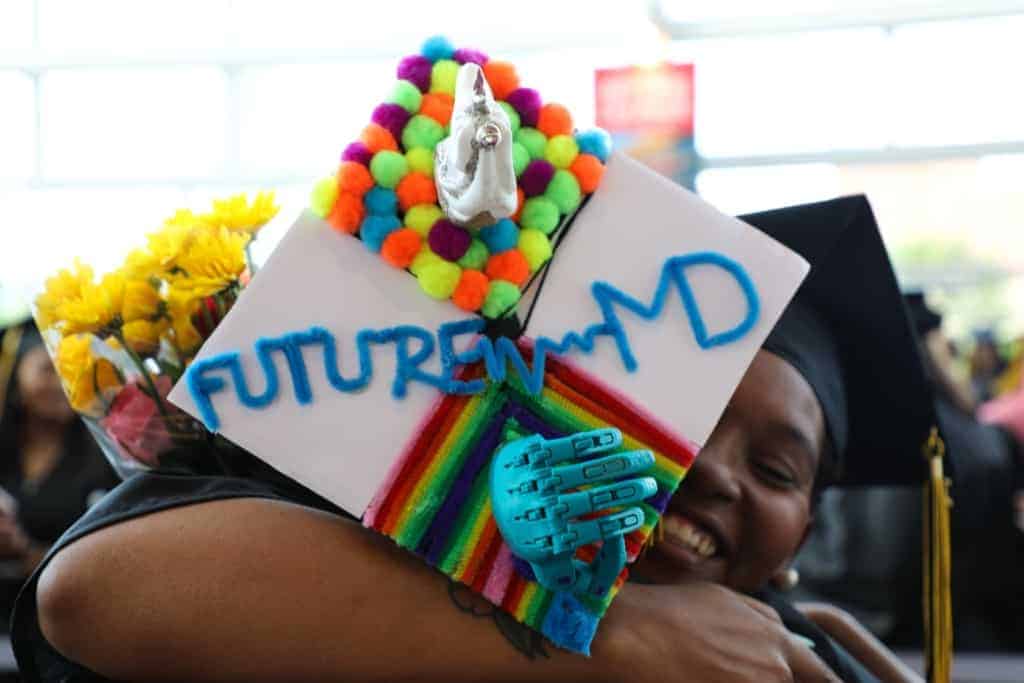
Tomlin and Conc present interesting parallels for using an Associate in Arts from Durham Tech as a bridge to a bachelor’s degree and future journalism careers. But they aren’t alone in portraying the benefit of community college, and specifically Durham Tech, as a launching pad for that path.
The UNC System maintains myriad data around graduates from the state’s public universities, including four-year graduation rates for both community college transfer students and students who start out at four-year universities. In 2014, the most recent year these four-year numbers have been tracked, 87% of students who started out at four-year universities graduated. That number for transfers who obtained their associate degree from Durham Tech: 93%.
That was Tomlin’s path, one she said made it easier for her to navigate the academic rigors of UNC-Chapel Hill. It is Conc’s path, one that’s instilled her with confidence to take on a private university this fall. It was Jailyn Gales’s path, too.
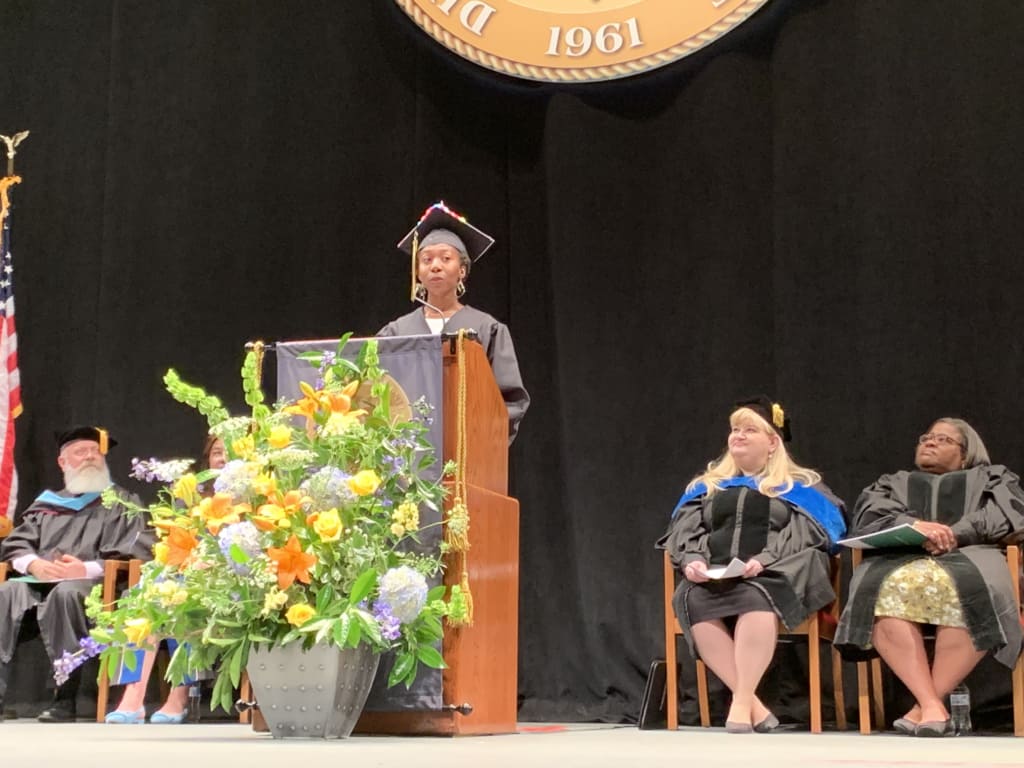
Known on campus as “The Unicorn,” Gales is president of Durham Tech’s student government association. She moved from Charlotte to the United Arab Emirates when she was younger and graduated high school at 15. She then became a full-time English teacher to help provide for her family before longing to return to the United States for college.
While researching college options, she was focused on campuses with diversity, a personal approach from instructors, and affordability. She chose Durham Tech. In the fall, she’ll continue her studies at N.C. State University. Afterwards, she hopes to become a surgeon and open clinics in southeast Asia and north Africa.
At commencement, as she addressed the graduates, Gales reminded them of the power of the degree they had earned and the diploma they were about to be handed.
“Our next journey is already starting,” she said. “Each one of you has your own story and past that have brought you here to this moment. Take a second to enjoy the feeling of success, because you deserve it. We, the graduates of Durham Tech, are forging great futures.”
Tomlin nods from a seat just behind Gales. She knows these words to be true because she’s lived them. Seated in the auditorium, Conc smiles at these words. She believes them to be true because she sees the proof on stage.
Recommended reading
